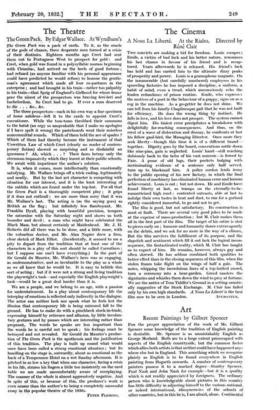The Theatre
The Green Pack. By Edgar Wallace. At Wyndham's
The Green Pack was a pack of cards. To it, as the oracle of the gods of chance, three desperate men turned at a crisis of their destinies. Eighteen months ago Creet had sent them out to Portuguese West to prospect for gold : and Creet, when gold was found in a polysyllabic morass beginning with Chumba-, had arrived on the heels of good fortune ; had refused (as anyone familiar with his personal appearance could have predicted he would refuse) to honour the gentle- man's agreement which made all four co-partners in the enterprise ; and had brought in his train—rather too palpably in his trainthat Sprig of England's Girlhood for whose beaux yeas the nicest of the prospectors was braving beri-beri and bachelordona. So Creet had to go. If ever a man deserved to die . . . &c., &e.
The three prospectors—each in his own way a fine specimen of hotno sahibens—left it to the cards to appoint Creet's executioner. While the tom-toms throbbed their summons to the baluk (an orgy so unspeakable that I make no apologies if I have spelt it wrong) the pasteboards went their noiseless noncommittal rounds. Which of them held the ace of spades ? Which of them had thereby become the instrument of that Unwritten Law of which Creet (clearly no reader of contem- porary fiction) shovied so surprising and so disdainful an ignorance ?' Ah, which . . . ? Their faces betray only the strenuous impassivity which they learnt at their public schools. We await with impatience the author's solution.
It is, when it comes, more intellectually than emotionally satisfying. Mr. Wallace brings off a trick ending, legitimately and neatly. But by the last act character is competing with situation for our interest, and it is the least interesting of the rabbits which are found under the top-hat. For all that the Green Pack is a thoroughly competent play ; it grips if it does not enthrall ; we are more than sorry that it was Mr. Wallace's last. The acting is (as the saying goes) as British as the flag ; but infinitely less flamboyant. Mr. Frarddin Dyall, playing with beautiful precision, tempers the saturnine with the Saturday night and shows us both bounder and devil ; a man who might have celebrated the Black Mass, but almost certainly at Maidenhead. Mr. J. H. Roberts did all there was to be done, and a little more, with the colourless doctor, and Mr. Alan Napier drew a firm, clear sketch of Mark Elliot. (Incidentally, it seemed to me a pity to depart from the tradition that at least one of the characters in a play of this sort should be called Carruthers ; but I suppose one can't have everything.) In the part of Sir Gerald du Maurier, Mr. Wallace's hero was as engaging, as undemonstrative, and as invaluable to the play as a whole as we all knew that he would be. It is easy to belittle this sort of acting ; but if it were not a strong and living tradition the playwright's task—and especially the English playwright's task—would be a great deal harder than it is.
We are a people, and we belong to an age, with a passion for understatement. In a play about contemporary life the interplay of emotions is reflected only indirectly in the dialogue. The actor can neither look nor speak what he feels lest the illusion that contemporary life is being mirrored fall to the ground. He has to make do with a pinchbeck stock-in-trade, expressing himself by reticence and allusion, by little involun- tary gestures and by pauses which are interesting rather than pregnant.. The words he speaks are less important than the words he is careful not to speak ; his feelings must be betrayed and not revealed. Sir Gerald du Maurier's produc- tion of The Green Pack is the apotheosis and the justification of this tradition. The play is built up round what would once fiave been called a strong emotional situation ; but its handling on the stage is, outwardly, about as emotional as the back of a Temperance Hotel on a wet Sunday afternoon. It is pitched in so low a key that when one character, facing a crisis in his life, strums his fingers a little too insistently on the card table we are made uncomfortably aware of overplaying. The manner of the whole is almost aggressively negative.. And in spite of this, or because of this, the producer's work is even nearer than the author's to being a completely successful essay in the popular theatre of the 1930s.
PETER FLEMING.






































 Previous page
Previous page